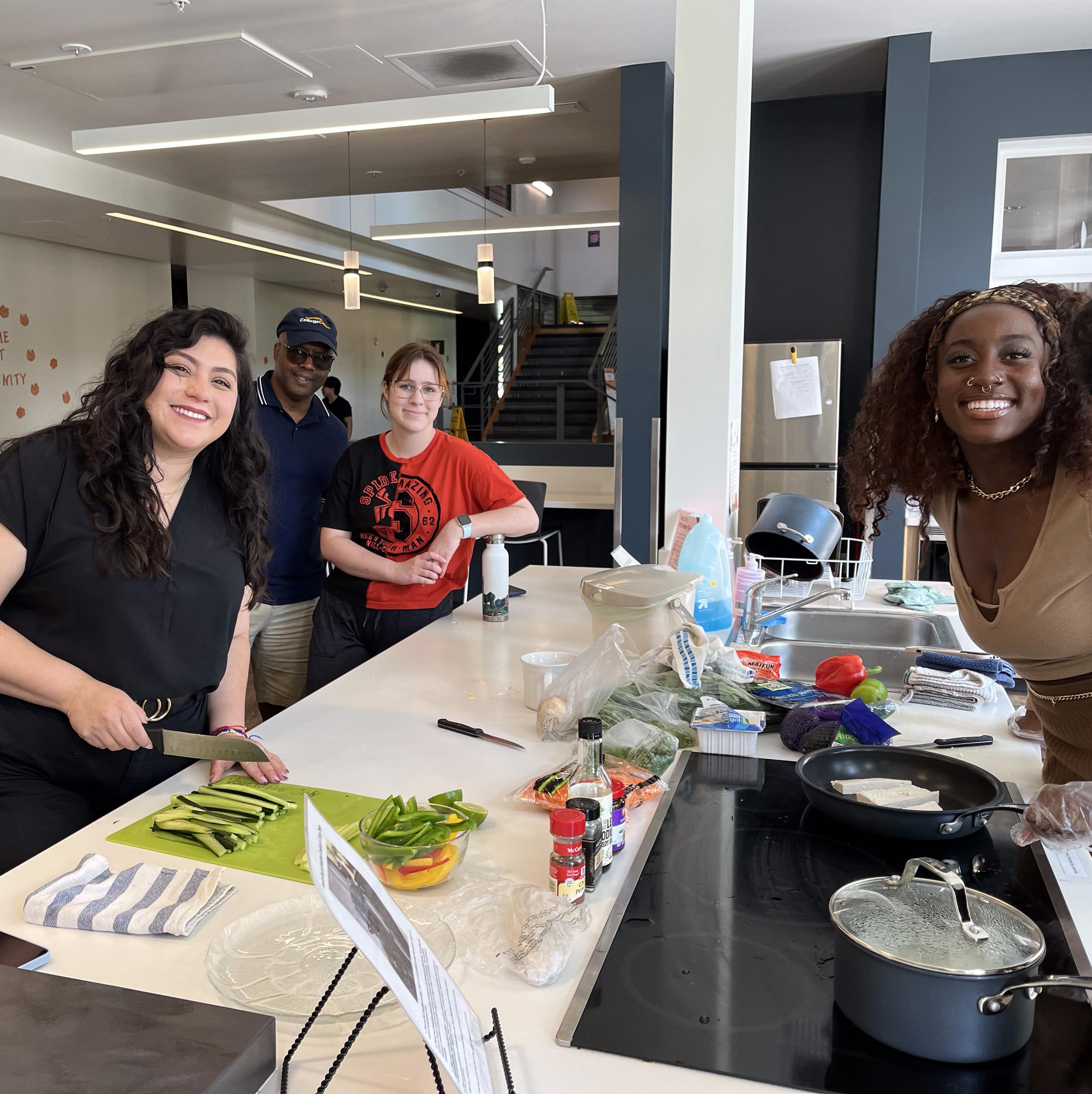

Sustainable Living Guide

Introduction
Welcome to the Sustainable Living Guide! The Sustainability Office has crafted this guide to introduce the many ways that Pacificans can apply sustainable practices in daily life, with the intention of helping support a better future for all living beings on this planet. In this guide you will visit campus “tour stops,” explore different resources available to you at Pacific, and find dozens of tips for reducing your carbon footprint both at Pacific and anywhere else life takes you.
What is the Sustainability Office?
Founded in 2010, the Sustainability Office is responsible for coordinating and implementing initiatives in the areas of policy & planning, operations, academics, and co-curricular learning that advance sustainable practices and understanding.

What is sustainability?
In short, sustainability is having healthy social, environmental, and economic systems that allow us to meet our needs and have a high quality of life in economically viable ways that are within the limits of the natural systems we depend on. This is derived from a UN Report on sustainable development where sustainable development is defined as “development that meets the needs of the present without compromising the ability of future generations to meet their own needs” (Brundtland Report, 1987).
Why is sustainability important?
We live on a planet with limited resources, many of which are being depleted at an alarming rate such as oil, copper, and zinc. Greenhouse gas emissions have increased exponentially since the 1850s, leading to ocean acidification, sea level rise, and increased frequency and intensity of extreme weather events such as fires, hurricanes, tornadoes, heat waves, and droughts. Slowing climate change is a task that requires collective action. Sustainability must be factored into all decisions, from how businesses are run to the foods we choose to eat, if we want society to thrive for generations to come.
Waste Streams Key
In each of the following campus “tour stops” you will find a Waste Tips section with items that are commonly found in each location. The icons below are placed next to each item and give direction as to which waste stream they should be properly disposed in: compost, recycling, or landfill. Alternatives are also listed—as indicated by the checkmark—to introduce you to more sustainable swaps. Compost
Waste
Landfill, compost, and recycling are the three streams of waste that discarded items go into at Pacific. Items need to be put in their proper waste streams to help minimize the repercussions of improper waste management and divert waste from landfills.
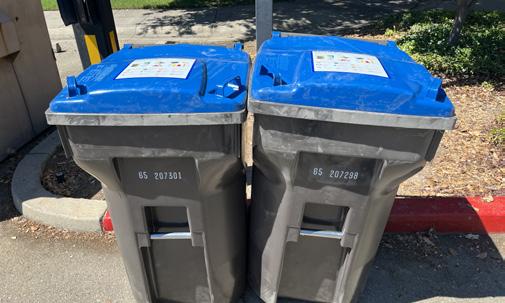


Where to dispose of recycling:
• Blue-lid bins and carts all around campus
Where to dispose of landfill waste:
• Black-lid bins all around campus
Where to dispose of organic waste:
• Green-lid carts all across campus
Be aware of signage — don’t ignore it.
Know what goes where and do your part to dispose of your waste items properly.
Recycling
Landfill



Green Team
The Pacific Green Team is a community of volunteers who help divert waste at campus events by monitoring waste stations and educating guests about compost and recycling. Each waste station includes a compost, recycling, and landfill container. Green Team is a free service for all campus event planners.
In addition to providing support at events, Green Team volunteers are also an integral component of the Green Move In and Green Move Out programs. During Green Move In, volunteers work with families to ensure that waste and recycling is disposed of correctly. At the end of Spring semester, Green Move Out volunteers collect and organize donations from all of the students who are moving out.
To volunteer for Green Team: Sign up for the volunteer opportunities by visiting the "Volunteer Opportunities" link at linktr.ee/pacificSLG.
To request Green Team at your event: At least three weeks before the event, fill out the “Green Team Request Form” found at linktr.ee/pacificSLG. A Sustaining Pacific representative will respond within a few days to confirm Green Team's participation and ask any additional questions.
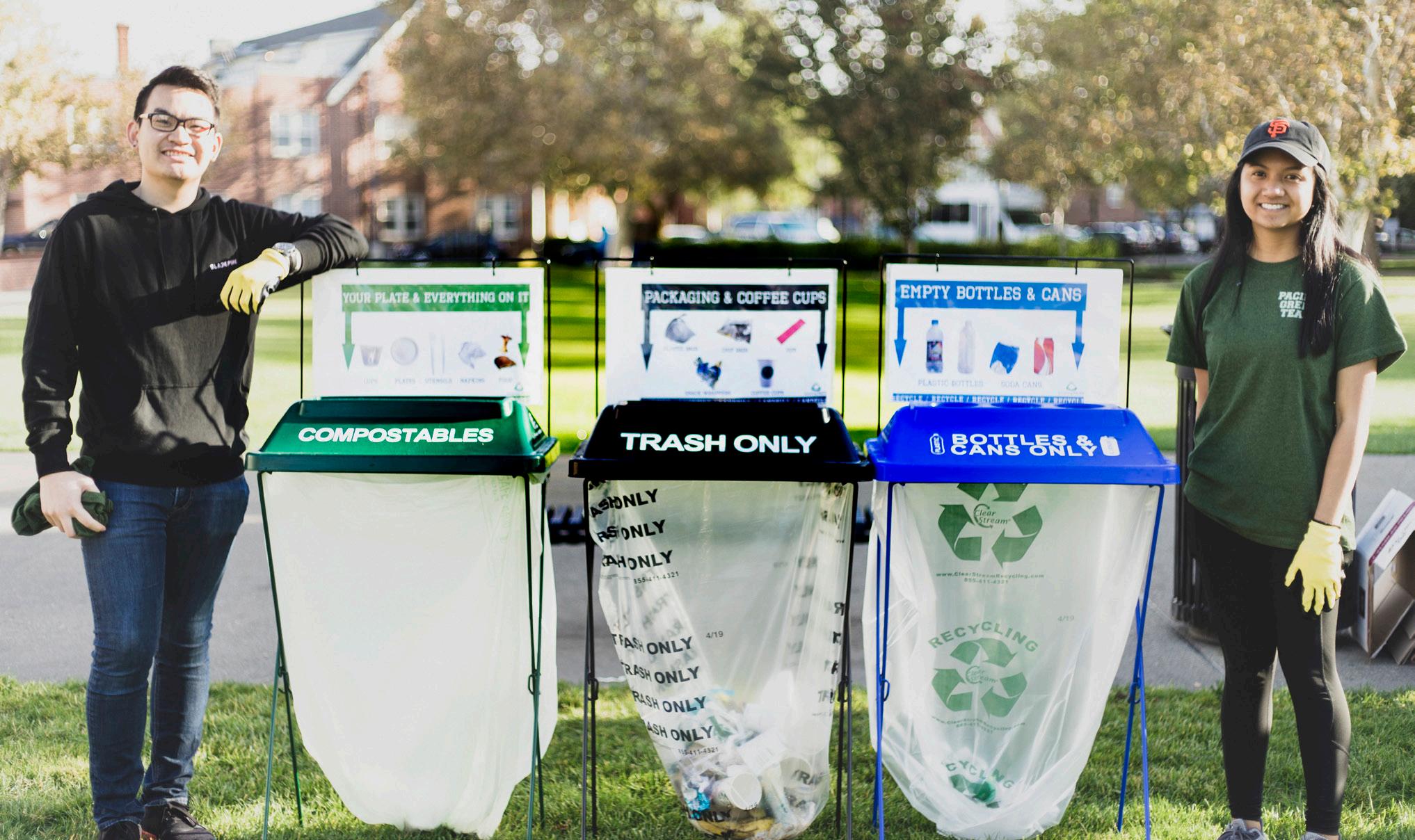
Sustainable Living Guide
Dorm Room
Tips
1. Unplug electronics when not in use and use a smart power strip. This makes it easier to turn off multiple devices at once and reduces energy use by equipment that is off but plugged in.
2. Instead of buying plastic water bottles, get a reusable bottle and refill using either the many hydration stations around campus or invest in a water filter.
3. Purchase plastic-free cleaning products, such as tablets that dissolve in water and can be used with any spray bottle.
4. If you need additional light, use LED bulbs. They last 20x longer and are 90% more efficient than traditional incadescent bulbs.
5. Looking to expand your wardrobe? Try thrifting rather than buying new clothes. Stockton has an impressive variety of thrift stores; you're bound to find some great outfits!
Re -home clothes tha t you no longer want!
Of fer them to your friends
Donate to a thrif t store
Bring to a textile rec ycling program

Resources
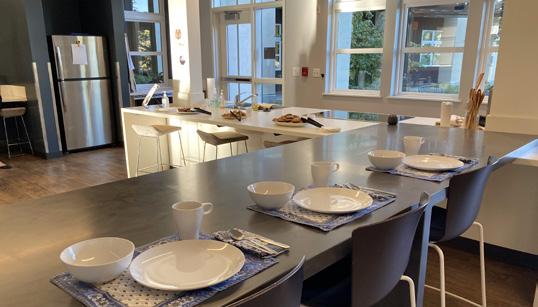
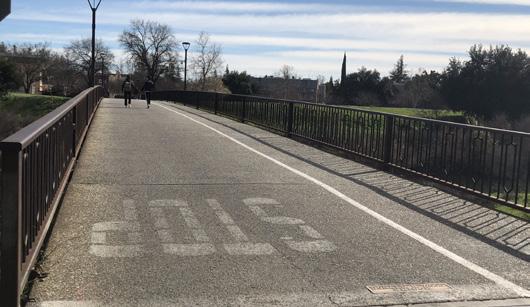


Pacific Kitchen Co-op
Don’t have access to a kitchen? Utilize the Pacific Kitchen Co-op, an on-campus community space with all cooking equipment provided. It is available for students, staff, and organizations to use for cooking and gathering.
Sustainability Walking Tour
In addition to teaching you about all the sustainability features on campus, the Sustainability Walking Tour map shows you where hydration stations, EV parking, and bike and skateboard storage locations are on campus.
Clothing Swaps
Every April, Sustaining Pacific holds a clothing swap where you can clear your closet and get new-to-you clothes for free.
Green Fashion Show
Feeling creative? Participate in the annual Green Fashion Show with a thrifted or upcycled outfit. Submissions are accepted through early Spring semester for the show in April.
Waste Tips
Paper
Use empty sides for...
• Notes
• Lists
Plastic Bottles
• Empty and rinse out
• Keep the lids on Get a reusable one
Plastic Bags
Use for trash bags
Save for future use
Get reusable bags instead
Bathroom
Tips
1. Report leaks to your RA
2. Turn off the faucet while you brush your teeth, shave, etc.
3. Take shorter showers to save water and energy.
4. Allow your hair to air or towel dry rather than using a blow dryer.
5. Common ingredients in personal care products are extremely harmful to the planet. Use ewg.org/skindeep to see what’s in your products and how safe they are.
6. Opt for bamboo and/or FSC (Forest Stewardship Council) certified toilet paper. Look for options packaged in paper instead of plastic.
Waste Tips
Shampoo and Conditioner Bottles
• Rinse and recycle
Reuse for homemade shampoo
Try plastic-free shampoo, conditioner, and body wash bars
Razors
Use a razor with replaceable blades or a recyclable safety razor
If ever y student at Pacific cut off 2 minutes from their shower, we could save an amount of water equivalent to 3 Olympic- sized pools per week
Source: www.bu.edu
Resources
https://www.ewg.org/skindeep/
Makeup Wipes
Use a cloth or natural makeup remover
Toilet Paper Rolls
Use as...
• Seed starters
• Holiday ornaments
Laundry Room
Tips
1. Only wash full loads. If you need to wash something more immediately, combine your load with your roommates to conserve water.
2. Clean the lint traps after every use. This allows the dryer to dry clothes faster and more effectively.
3. Save energy by washing your clothes in cold water rather than warm. They’ll be just as clean, the colors won’t bleed, and they will be less likely to shrink.
4. Opt for reusable dryer balls instead of dryer sheets. Dryer sheets are single-use and made of polyester and chemical fragrance.
5. If you can, hang your clothes up on a drying rack to allow them to air dry instead of using the dryer.
Waste Tips
Detergent Bottles
• Rinse and recycle
Purchase boxed or paper bagged detergent
Dryer Sheets
Purchase reusable dryer balls
Dryer Lint
Use for...
• Stuffing small crafts
• Lining plant pots
Source: michaelbluejay.com
Kitchen
Tips
1. One of the most effective things you can do to reduce your environmental impact is reduce or eliminate meat from your diet.
2. When shopping, opt for food packaged in glass and cardboard rather than plastic.
3. Eat locally and seasonally to minimize carbon emissions and maximize nutritional benefit.
4. Only cook what you will eat and save leftovers for a meal the next day.
5. If you have leftovers you know you won’t eat, transform them by adding other ingredients, turning them into soup, or freeze them for later instead of letting them go to waste.
6. When hand-washing your dishes, keep the water off unless actively rinsing each dish.
7. It doesn’t take a gallon of water to boil pasta or veggies; control your water usage for boiling.
If Pacific students each ate one less serv ing of beef per week, we would avoid
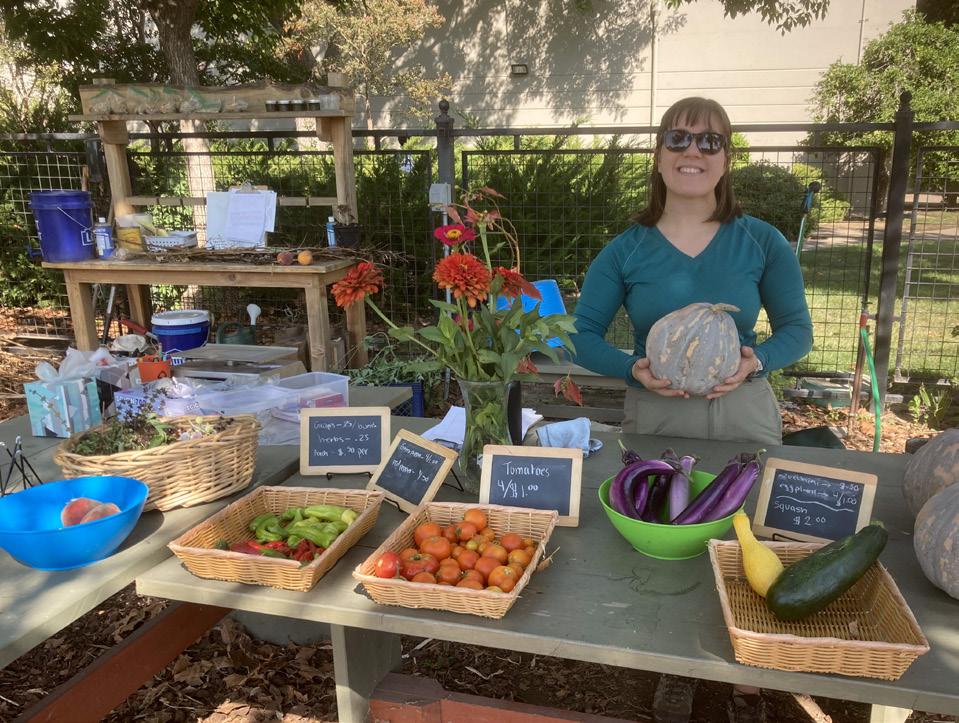
Source : css.umich.edu
Resources


Ted & Chris Robb Garden
Volunteer, intern, or work in the organic garden to learn to grow food. For the most up-to-date schedule of times to get produce, follow Sustaining Pacific on Instagram or subscribe to our monthly newsletter.
Pacific Food Pantry
If you are experiencing food insecurity, talk to a Care Manager and utilize the on-campus food pantry. Check our Instagram or newsletter for the current hours.
Pacific students are estimated to throw away $11,273,400 of food every year (but it doesn’t have to be that way!)
Source: foodprint.org
Waste Tips
Food Scraps
• Collect and dispose of in an organics cart
Frozen Food Trays
Try meal prepping and storing food in reusable containers
Styrofoam Containers
Remember to bring a reusable takeout container when going to a restaurant
Classrooms
Tips
1. Buy e-books or buy or rent used books from the university bookstore.
2. Don’t throw away half-used notebooks at the end of the semester; use the notebook for another class or as scratch paper.
3. Use a device or app to take notes rather than using paper.
5. If possible, print using both sides of the sheet to save paper. Use PacificPrint for low-cost printing instead of buying a personal printer.
6. Take a sustainability course! Even if it doesn’t apply to your major, sustainability is interdisciplinary so any student can take a class on it at Pacific.
Pacific spends
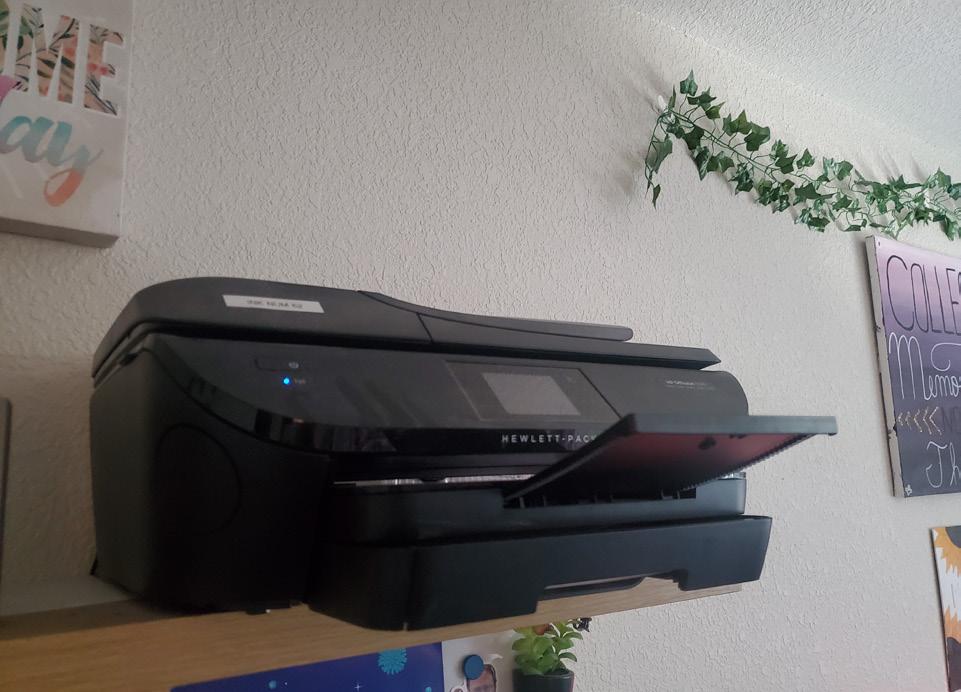
Resources


The University Bookstore
The bookstore sells used and rentable books. If you want to go virtual, you can also purchase them as e-books.
William Knox Holt Memorial Library
You can check out books from the Stockton Public Library and the William Knox Memorial Library on campus. At the Knox Memorial Library you also have access to the Green File database and sustainability research guides.
Waste Tips
Sticky Notes
Cut up used paper into quarters and keep a stack handy to write things down
Staples, Labels, and Stickers
(Attached to Paper)
• These small contaminants are removed during the recycling process
Books
Check out books from the library Participate in a trade-in program
Donate or sell back your books
DeRosa Unversity Center
Tips
1. If eating in the DeRosa Center, use their silverware rather than plastic (and make sure to return it!). If you are eating to-go, carry a set of reusable utensils on you.
2. Avoid taking more than what you will eat.
3. Incorporate more meatless meals into your diet with the help of the herbivore station in the Marketplace.
4. Use reusable to-go mugs and containers. Get Tiger To-Go mugs and clamshells from any Marketplace cashier.
Resources


Not sure where your waste is going? Everything that goes through the dish return is sorted and properly disposed of by Bon Appetit.
Tiger To-Go Program
Tiger To-Go is a program at the DeRosa Center Marketplace that offers reusable eco-clamshells instead of disposable ones. Each time you use the eco-clam you will save $1 (the cost of a disposable clamshell). You can exchange a used eco-clam for a clean one, or a token for next time.
Waste Tips
Food Scraps
• Leave on your plate; they will be composted after going through the dish return
Coffee Cups
• Coffee cups are coated in plastic and go in the landfill
• Recycle cardboard sleeves Bring your own coffee cups and receive a $0.10 discount at Starbucks
Utensils
Use reusable containers and utensils in place of single-use disposables
Resources
Connect with Sustainability:
Instagram: @sustaining_pacific
Facebook: @sustainingpacificuop
sustainingpacific@pacific.edu (209) 932–2991
pacific.edu/sustainability
Here are some more helpful resources! Links to all resources are available at linktr.ee/pacificSLG
Sustainability Newsletter: Subscribe to our newsletter for events, updates, and tips about sustainability at Pacific.
Green Event Guide: If your club or organization is hosting an event, check our Green Event Guide to ensure you’re practicing sustainable habits. Don’t forget to contact Green Team at least 3 weeks to get compost and recycling containers at your event.
Sustainability Project Investment Fund (SPIF):
If you have a project idea for how Pacific can be more sustainable, apply for SPIF and your idea could get funded. Open to students, staff and faculty, this fund has an annual pool of $150,000 that you can get a piece of.
Transportation: Use the Stockton bus system for low-impact transportation around the city, and the Pacific Shuttle can take you to popular shopping locations in Stockton. Zipcars and BikeStockton e-bikes are available across campus to rent for students In need of transportation.
Campus waste management training: This 10 minute (or less) online training will teach you how to sort your waste correctly at Pacific and why it’s so important to do so.
Sustainability Walking Tour: Learn about the sustainability resources, buildings, and features that Pacific has on the Stockton campus
Stockton Recycles: This handy website helps you find out how to sort your waste in Stockton and learn safe ways to dispose of questionable items. This virtual glossary has information and alternatives for almost anything you will ever need to get rid of.
Volunteer Portal: Check out the Sustainability Volunteer Portal for opportunities to volunteer with the Pacific Gardens, Pacific Food Pantry, Green Team and more.
